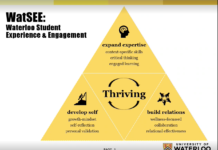Dear Members of the Presidents Advisory Committee on Student Mental Health,
As a student who is suffering from mental health problems, I feel that your main focus should be trying to remove the negative stigma surrounding mental health on campus.
Many of you may feel that this does not exist, since the students who speak out are generally those who have embraced the culture and have taken steps to utilise the services you provide on campus with varying degrees of success.
Other people, for example, some of my friends, are aware of such services but refuse to take advantage of them because they might feel like they don’t need it and because they don’t want to seem “weak.”
The media sometimes makes it seem like mental health issues aren’t normal and only people in 13 Reasons Why or on Tumblr are impacted by mental illness.
These people don’t want to identify with these groups, but they fail to realize that when they feel like they lack motivation, believe they are failures, or have trouble getting out of bed in the morning, they can be helped too.
Spreading awareness is a good step to reaching out to those in need, but it must be presented in a way that appeals to groups that might be too afraid to take initiative and get help for themselves.
For example, I personally am afraid of using UW MATES even though I know the students there are empathetic, highly trained, and passionate about what they do.
I’m terrified of sharing my personal problems outside of a professional setting, and I feel that the exchange will not benefit me more than talking to a friend about this problem.
The focus should be on normalizing the use of these services, and trying to remove some misconceptions surrounding them.
With this, it must be taken into account that the university should not be bringing the services closer to students (ie. UGuelph’s knocking on doors or putting a counsellor in UWP).
This can be invasive to those that aren’t ready to reach out for help. It seems like a PR stunt that makes people like me think that there is no hope, and that the administration (or those who speak out) are just trying to find an easy way to fix the problem and have little understanding of what it is like being someone with mental health issues. The willingness to help yourself is the most important factor in getting better.
When I first went to counselling services, for my first few sessions, I felt patronized and I almost considered giving up. But I really wanted to get better so I gave it another shot and I now have done 7-8 sessions with my counsellor, and I’m feeling better about myself every day. The proximity of the service did not affect my decision to help myself and many people need to realize that they want to help themselves too.
Coddling students at the university by forcing them to get help, like a parent would, leaves no room for personal growth. It is not the job of the university to be such a parent.
It is of vital importance that you try to reach out to students who might be struggling but don’t think they need help, educating them in a way that makes them feel comfortable in taking advantage of school services, and above all allow them to help themselves.
I think it is great that you have a committee to analyze the problem and do proper research before you take action, but I implore you to not let those students who are loud to speak for the whole and instead, help everyone to speak for themselves.
Yvonn Yu
2A Political Science & Science































